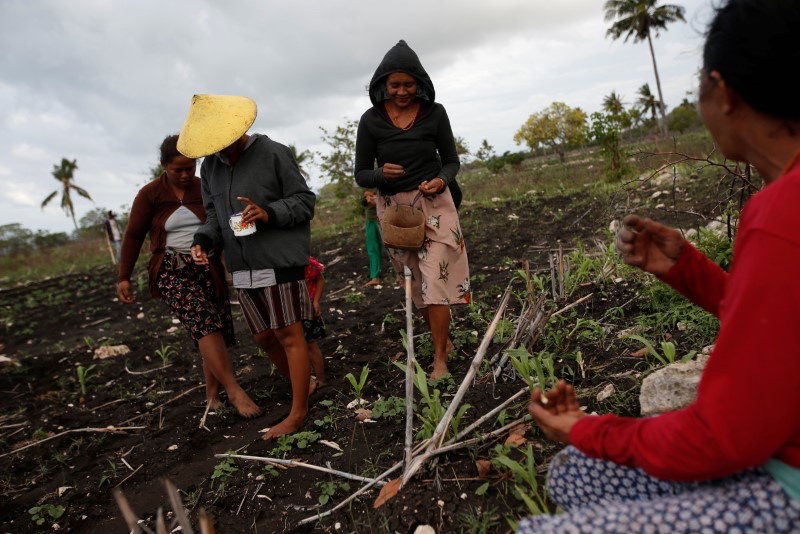Kuala Lumpur, Malaysia
Thomson Reuters Foundation
A social protection scheme to help poor Indonesians living in rural areas by giving them cash also reduced deforestation by 30 per cent, researchers said on Friday, fuelling hope that efforts to tackle poverty and protect forests can work in tandem.
The study analysed Indonesia’s national anti-poverty program – which transfers money to poor households that follow health and education guidelines – looking at about 7,500 forest villages that received money from 2008 to 2012.

Sumbanese villagers work on a field seeding peanuts in Hamba Praing village, Kanatang district, East Sumba Regency, East Nusa Tenggara province, Indonesia, on 23rd February. PICTURE: Reuters/Willy Kurniawan/File photo
“No matter which way we looked at it, the anti-poverty program on average leads to reduction in deforestation in the villages receiving it,” said study co-author Paul Ferraro, a professor of human behaviour and public policy at Johns Hopkins University in the United States.
Over the last two decades, Indonesia managed to cut its poverty rate by more than half to just under 10 per cent of its 260 million population in 2019, according to the World Bank.
The South-East Asian nation, which is home to the world’s third-largest tropical forests, is also the top global producer of palm oil – which generates millions of jobs but is blamed by environmentalists for forest loss and fires.
Indonesia, the world’s fourth-most populous nation, was named as one of the top three countries for rainforest loss in 2019, according to data published this month by Global Forest Watch, a monitoring service that uses satellites.
The new study on Indonesia, published in the journal Science Advances, looked at data on tree-cover loss for villages near forests, before and after the welfare program began.
Cash-based schemes to tackle poverty are becoming increasingly popular in developing countries, with 16 tropical nations having adopted such methods, Ferraro noted.
The Indonesian program – still being phased in across the archipelago – makes “modest” quarterly cash payments equating to about 15 to 20 per cent of recipients’ household consumption, he said.
The 266,533 households analysed for the study were located in the 15 provinces that make up half of Indonesia’s forest cover and account for about 80 per cent of its deforestation.
Researchers found that farmers in these villages typically cleared forest to plant more crops if they expected low yields, due to delays in the monsoon season or prolonged drought.
But when given cash payments, they switched to buying from markets rather than clearing forest, or were able to take out loans using the government handout as a guarantee, said Ferraro.
Before scaling up such cash schemes worldwide, Ferraro urged more research on their environmental benefits.
A separate study in Mexico, using different methods, found a small rise in deforestation as locals may have used the cash to keep more cattle, clearing forest for grazing, he noted.
“We’re not going to solve the rainforest problems with a conditional cash transfer program,” he said.
“[But] it provides space for these two groups – the anti-poverty and pro-environment groups – to be more collaborative.”






